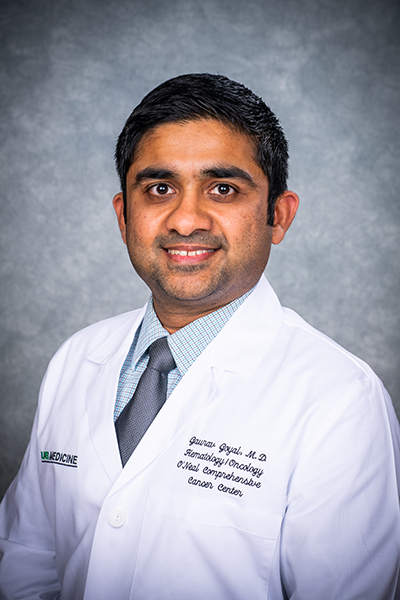Media contact: Savannah Koplon
 Gaurav Goyal, M.D.The O’Neal Comprehensive Cancer Center and Gaurav Goyal, M.D., assistant professor in the Division of Hematology and Oncology at the University of Alabama at Birmingham, have become a part of the Erdheim-Chester Disease referral care center network for the ECD Global Alliance. The alliance enables UAB to be one of only 33 providers in the country to treat ECD.
Gaurav Goyal, M.D.The O’Neal Comprehensive Cancer Center and Gaurav Goyal, M.D., assistant professor in the Division of Hematology and Oncology at the University of Alabama at Birmingham, have become a part of the Erdheim-Chester Disease referral care center network for the ECD Global Alliance. The alliance enables UAB to be one of only 33 providers in the country to treat ECD.
ECD is a rare subtype of histiocytic disorders where too many histiocytes, or white blood cells, build up and can affect the brain, bones, lungs, heart and kidneys in different ways. The illness requires physicians across specialties to diagnose and treat patients. The disease is a slow-growing blood cancer that was recently recognized in 2016 by the World Health Organization.
Goyal has had plenty of experience with diagnosing and helping patients with ECD through his fellowship at the Mayo Clinic and his research projects that have helped shed light on this illness.
“During my fellowship training, I was drawn to the unmet need that was posed by these disorders,” Goyal said. “I was able to put together a group of experts to improve patient care, education and research through the help of my mentor. My research projects were to help define the clinical features and treatment options for ECD. Finally, our group published guidelines that focused on appropriate diagnosis for ECD patients. At UAB, we have already established a similar group of experts.”
Before the O’Neal Comprehensive Cancer Center joined the network, the state of Alabama had no care centers for patients suffering from ECD or other histiocytic disorders. Now, histiocytosis patients in Alabama and the surrounding states have access to a vital resource for their care. This network serves patients directly and will also work with the patient’s medical team.
Goyal is hopeful for the center’s future. “The vast expertise available at UAB makes me hopeful that we will become a major destination for patients so that they can get the care they need,” Goyal said.